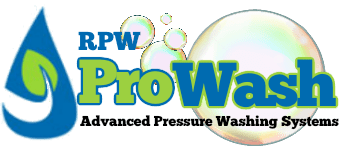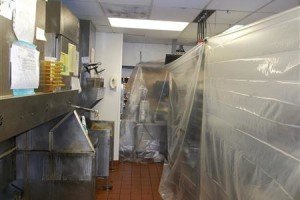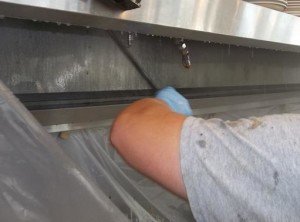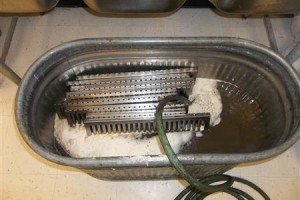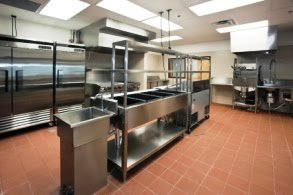2013 Decks & Porches
2013 Gutter Cleaning
2013 Deck Maintenance
Gilberts Restaurant Hood Cleaning is essential and mandatory in the state of Illinois
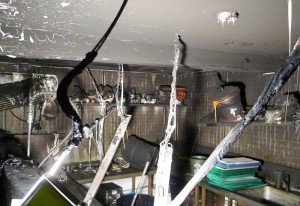 Oil fires start at on or in typically the stoves and advance up right into a greasy exhaust hood, or even start in your hood or ducting itself. When severe, a fire can bring about loss of your business and even loss of life! Even a modest hood fire might cause a lot of damage to your equipment as well as smoke damages to your entire facility. Fortunately the actual oven and hood fire in the fastfood restaurant pictured to the left was put out very quickly. Nonetheless observe the heavy fire and smoke damage to the kitchen as well as equipment.
Oil fires start at on or in typically the stoves and advance up right into a greasy exhaust hood, or even start in your hood or ducting itself. When severe, a fire can bring about loss of your business and even loss of life! Even a modest hood fire might cause a lot of damage to your equipment as well as smoke damages to your entire facility. Fortunately the actual oven and hood fire in the fastfood restaurant pictured to the left was put out very quickly. Nonetheless observe the heavy fire and smoke damage to the kitchen as well as equipment.

We are proud members of the UAMCC
The United Association of Mobile Contract Cleaners is a nationwide network of pressure washing contractors that embraces the power washing and mobile cleaning industry.
The following is a brief tour of our Gilberts restaurant hood cleaning procedure:
NFPA COMPLIANCE
NFPA 96 STANDARDS
National Fire Protection Association regulations are specifically designed to limit the life safety concerns and fire hazards associated with commercial cooking equipment and rooftop grease containment*. At Rockford ProWash Kitchen Hood Cleaning Services we take all the necessary steps to comply with these codes on your behalf.
7.8.2.1 (4) The ability to drain grease out of any traps or low points formed in the fan or duct near the termination of the system into a collection container that is noncombustible, closed, rainproof, and structurally sound for the service to which it is applied and that will not sustain combustion.
7.8.2.1 (4) The ability to drain grease out of any traps or low points formed in the fan or duct near the termination of the system into a collection container that is noncombustible, closed, rainproof, and structurally sound for the service to which it is applied and that will not sustain combustion.
11.6.2* Hoods, grease removal devices, fans, ducts, and other appurtenances shall be cleaned to remove combustible contaminants prior to surfaces becoming heavily contaminated with grease or oily sludge.
8-3.1.1 Upon inspection, if found to be contaminated with deposits from grease-laden vapors, the entire exhaust system shall be cleaned by a properly trained, qualified, and certified company or person(s) acceptable to the authority having jurisdiction in accordance with Section 8-3.
3-2.3 Grease filters shall be listed and constructed of steel or listed equivalent material and shall be of rigid construction that will not distort or crush under normal operation, handling, and cleaning conditions. Filters shall be tightfitting and firmly held in place.
4-3.1 Openings shall be provided at the sides or at the top of the duct, whichever is more accessible, and at changes of direction. Openings shall be protected by approved access panels that comply with 4-3.4.4. Exception: Openings shall not be required in portions of the duct that are accessible from the duct entry or discharge.
5-1.1 Approved upblast fans with motors surrounded by the airstream shall be hinged, supplied with flexible weatherproof electrical cable and service hold-open retainers, and listed for this use.
6.2.3.1 Grease filters shall be listed and constructed of steel or listed equivalent material
6.2.3.2 Grease filters shall be rigid construction that will not distort or crush under normal operation, handling, and cleaning conditions.
6.2.3.3 Grease filters shall be arranged so that all exhaust air passes through the grease filters.
7.3.1 Openings shall be provided at the sides or at the top of the duct, whichever is more accessible, and at changes of direction.
7.4.1.3 Openings on horizontal grease duct systems shall be provided with safe access and a work platform when not easily accessible from a 3 m (10 ft) stepladder.
8.1.1.1 Approved upblast fans with motors surrounded by the airstream shall be hinged, supplied with flexible weatherproof electrical cable and service hold-open retainers, and listed for this use.
8.1.5.3.1 Upblast fans shall be supplied with an access opening of a minimum 76 mm by 127 mm (3 in. by 5 in.) or a circular diameter of 101 mm (4 in.) on the curvature of the outer fan housing to allow for cleaning and inspection of the fan blades.
11.6.10 When an access panel is removed, a service company label or tag preprinted with the name of the company and giving the date of inspection or cleaning shall be affixed near the affected access panels.
* Reprinted with permission from NFPA 96 Standard for Ventilation Control and Fire Protection of Commercial Cooking Operations ©1998, National Fire Protection Association, Quincy, MA 02269. The reprinted material is not the complete and official position of the National Fire Protection Association, on the referenced subject, which is represented only by the standard in its entirety.
